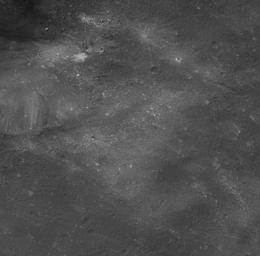
|
Dark Desolation
- Click the image above for a larger view
- Full-Res JPEG (1001 x 986) (108.8 kB)
- Full-Res TIFF (1001 x 986) (856.7 kB)
Caption:
On June 11, 2004, during its closest approach to Phoebe, Cassini obtained this extremely high resolution view of a dark, desolate landscape. Regions of different reflectivity are clearly visible on what appears to be a gently rolling surface. Notable are several bright-rayed impact craters, lots of small craters with bright-colored floors and light-colored streaks across the landscape. Note also the several sharply defined craters -- probably fairly young features -- near the upper left corner.
This high-resolution image was obtained at a phase, or Sun-Phoebe-spacecraft, angle of 30.7 degrees, and from a distance of approximately 2,365 kilometers (1,470 miles). The image scale is approximately 14 meters (46 feet) per pixel. The image was high-pass filtered to bring out small scale features and then enhanced in contrast.
Background Info:
The Cassini-Huygens mission is a cooperative project of NASA, the European Space Agency and the Italian Space Agency. The Jet Propulsion Laboratory, a division of the California Institute of Technology in Pasadena, manages the Cassini-Huygens mission for NASA's Office of Space Science, Washington, D.C. The Cassini orbiter and its two onboard cameras, were designed, developed and assembled at JPL. The imaging team is based at the Space Science Institute, Boulder, Colo.
For more information, about the Cassini-Huygens mission visit, http://saturn.jpl.nasa.gov and the Cassini imaging team home page, http://ciclops.org .
Cataloging Keywords:
| Name | Value | Additional Values |
|---|---|---|
| Target | Phoebe | |
| System | Saturn | |
| Target Type | Satellite | |
| Mission | Cassini-Huygens | |
| Instrument Host | Cassini Orbiter | |
| Host Type | Orbiter | |
| Instrument | Imaging Science Subsystem (ISS) | |
| Detector | ||
| Extra Keywords | Crater, Grayscale, Impact | |
| Acquisition Date | ||
| Release Date | 2004-06-14 | |
| Date in Caption | 2004-06-11 | |
| Image Credit | NASA/JPL/Space Science Institute | |
| Source | photojournal.jpl.nasa.gov/catalog/PIA06069 | |
| Identifier | PIA06069 | |
